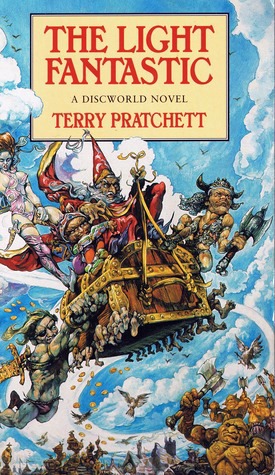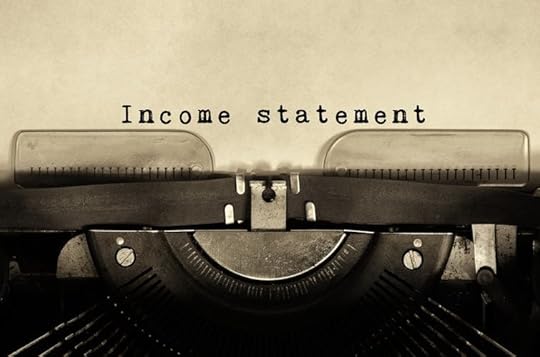Tyson Adams's Blog, page 27
February 24, 2019
Book vs Movie: BlacKkKlansman – What’s the Difference?
[image error]
This month’s What’s the Difference? from Cinefix covers the amazing Spike Lee film based on the autobiography of the same name: BlacKkKlansman.
I have been reading quite a bit about fascism and racism lately. As someone who got lucky to be living in privileged skin, these are issues I feel we all need to be more aware of and actively standing against.
Instead of my normal comment on the film or book, I suggest watching the Vice coverage of the Charlottesville rally, Philosophy Tube’s videos on racism, Antifa and fascism, and reading the book on how to oppose fascism.
February 21, 2019
Book review: The Light Fantastic by Terry Pratchett
 The Light Fantastic by Terry Pratchett
The Light Fantastic by Terry Pratchett
My rating: 5 of 5 stars
Luggage that doesn’t get lost? This must be a fantasy novel.
After shooting off the edge of the Discworld in The Colour of Magic, Rincewind and Twoflower are magically returned to the Disc for reasons unknown. The world turtle, Great A’Tuin, is swimming through space, excited about the red star it is approaching. The Wizards have noticed the red star and the magical change that allowed Rincewind and Twoflower to return, allowing them to uncover an ancient prophecy. Can the prophecy be fulfilled before Great A’Tuin reaches their destination?
When I finished The Colour of Magic I was a little peeved. Whilst a continuing story cliffhanger is a common fantasy trope, a book satirising fantasy tropes should surely rise above such shenanigans. That downgraded my rating to 4 stars.
Happily, The Light Fantastic finished the story started in The Colour of Magic in a highly entertaining fashion. I especially enjoyed the introduction of Cohen the Barbarian, being a fan of the Robert E Howard stories. Death and the other horsemen learning Bridge had me grinning for days. I wouldn’t rate this as one of Pratchett’s best Discworld novels, but it certainly started the ball rolling.
February 19, 2019
Book review: Old Scores by David Whish-Wilson
 Old Scores by David Whish-Wilson
Old Scores by David Whish-Wilson
My rating: 5 of 5 stars
New tourism campaign: Come to Perth, where you can grift in peace.
Former Detective, Frank Swann, is starting a job with the new Western Australian Premier. The exact nature of his job is unclear. The exact motives of those around him are even less clear. Power players are moving to get their slice of the development and mining booms that are starting. The “facilitators” have their hands out. The usual underworld players – from bikies to bank robbers – see their chance as well. And the target is painted on Frank as he’s caught in the thick of it.
Back in 2016, I was lucky enough to attend the book launch for Old Scores. As a long time fan of David’s, it surprised me to realise that over two years had elapsed since getting my signed copy. If I’m honest, I feel pretty guilty for not having read it immediately. I got there… eventually.*
David is a fantastic writer and Old Scores is another great crime novel from him. He delivers with a gritty and evocative style that us crime fans love. Set in Perth, you not only get the feel of the city, but you have a sense of the underbelly that shaped it. I was too young to really understand WA Inc, but David capitalises on those, and other, events to craft his own tale. In many ways, it is often hard to spot what is a fictionalised historical event and what is actual fiction.
Old Scores is a must for any crime fiction fan and for anyone who wants to get a sense of what Perth and Western Australia were like in the 1980s.
*I promise I’ll read the next one sooner, David.
February 17, 2019
Too Many Books?
I think you mean, not enough bookshelves.
[image error]Source? Help me out. I can’t make out that signature and image search just gave me endless Pintrest pages linking to one another.
February 14, 2019
Book review: Doughnut by Tom Holt
My rating: 3 of 5 stars
Life is like a box of doughnuts. Mmmmmmm, doughnuts!
Theo Bernstein is on something of a losing streak. He lost his money, he lost his wife*, he lost his job, and he lost the visibility of one of his arms. Given how high profile the reason for losing his job was – who knew people would miss a mountain? – it’s a wonder he is able to find any work at all, first at an abattoir, then at a hotel. The hotel gig might be easier than hauling offal, but it’s a weird job, made weirder by the strange bottle left to him by his old professor, Pieter van Goyen. How can this bottle be the future of entertainment? And is there a doughnut shop nearby?
In the middle of last year, an author friend – Kaaron Warren** – recommended The Management Style of Supreme Beings to me. It was one of the nominees for an international award she was judging and she spoke glowingly of it. I’d previously enjoyed one of Tom’s books under his KJ Parker pseudonym, so I decided to track it down at the library. Obviously, I was unsuccessful, as instead, I ended up with Doughnut.
This explanation is a roundabout way of saying that I had high expectations for this novel. In some ways, Doughnut managed to rise to those expectations. Holt is a very sharp and inventive author. There are plenty of genuinely funny moments and ideas in this book. But somehow I felt it was all a bit pointless and inane.
In some ways, this is a product of the very British bumbling protagonist used in this novel. It tends to influence the way the story is told, usually in a way that is deliberately frustrating but with the reward of large doses of humour. Unfortunately, I’m not sure this was quite funny enough for the narrative style.
So while this was quite entertaining, I had hoped for more, particularly in the humour department.
*Lost his wife in the sense that she decided to leave him, not the lost in the ‘we were just walking through the Xmas sales and she let go of my hand for a moment and now I can’t find her in this crowd’ kind of way.
** Read her books: https://www.goodreads.com/author/show…
February 12, 2019
How Greek Mythology Inspires Us
[image error]
Did you know that James Joyce’s Ulysses is a (relatively) modern tale inspired by Ancient Greek Mythology? Well, even if you did know that, this video has something for you.
Given this video series has focussed on literature and books made into movies more than popular fiction, I knew that one of my favourite genres wouldn’t get a mention. The vigilante hero/anti-hero traces its origins back to the Ancient Greek Myths as well. The most obvious versions are The Wanderer or Knight Errant which draw upon themes and ideas from heroes like Perseus. This early creation underpins later takes on the hero. And thus, Jack Reacher could be slaying gorgons and saving royals.
Interestingly, the Knight Errant is also prevalent in literature not influenced by Ancient Greek Mythology. So it is possible that convergent ideas are at work.
Ancient Greek Mythology has worked its way into modern pop culture so deeply that it would be an almost Sisyphean task to compile every way it’s manifested!
It’s Lit! is part of THE GREAT AMERICAN READ, a eight-part* series that explores and celebrates the power of reading. Hosted by Lindsay Ellis
*Eleven part series now.
February 10, 2019
Free Why-Fi
February 5, 2019
How writers take revenge on critics
I think any writer could confirm the truth of this.
[image error]Source
Another brilliant cartoon from Tom Gauld in The Guardian Review.
February 3, 2019
Death, Personified
[image error]
Finally, an episode of It’s Lit about everyone’s favourite Terry Pratchett character. Oh, and a few other versions of it from lesser authors.
Lindsay Ellis fans will have noticed similarities between this video and an earlier Loose Cannon video she did on the same topic. Worth watching both and noting what having a production budget allows for.
Death as a character reveals how we process one of life’s greatest mysteries, and there’s a lot more breadth to how the grim reaper is depicted than you might think.
It’s Lit! is part of THE GREAT AMERICAN READ, an eight-part series that explores and celebrates the power of reading. Hosted by Lindsay Ellis.
January 31, 2019
Five ways to boost Australian writers’ earnings

By changing our approach to author rights, we can help writers earn more.
shutterstock
Rebecca Giblin, Monash University and Joshua Yuvaraj, Monash University
Who makes the money in publishing? Nobody. This often repeated dark joke highlights a serious issue. The most recent figures show that Australian authors earn just $12,900 a year from writing work (the median, at $2,800, was even worse). Indeed, authors can gross less than $5,000 for Miles Franklin-nominated titles that took two or more years to write.
Fixing this isn’t as simple as reaching more deeply into publisher pockets, because most of those are empty too. While the major international houses are thriving (Simon & Schuster and Penguin Random House recently reported 16% profits), publishing Australian stories can be financially perilous.
In independent publishing, 10% of the book sale goes to the author, perhaps another 10% to the printer, and up to a whopping 70% for distribution. What’s left has to pay the publisher, editor, marketers, admin staff and keep the lights on.
But we can improve our approach to author rights. Here are five lessons we can learn from elsewhere to help Australian writers earn more money.
Read more:
Scrounging for money: how the world’s great writers made a living
#1: Give authors stronger out of print rights
Traditionally, contractual “out of print” clauses have let authors reclaim their rights when a print run has sold out and the publisher doesn’t want to invest in another. But in our recent analysis of almost 150 contracts in the Australian Society of Authors archive, we found 85% of contracts with these clauses allowed authors to reclaim their rights only when the book was “not available in any edition”.
These days, books can be kept available (at least digitally or via print-on-demand) forever – but that doesn’t mean their publishers are still actively promoting them.
A better approach is to allow authors to reclaim their rights towards the end of a work’s commercial life, determined with reference to objective criteria like the number of copies sold or royalties earned in the previous year. The Australian Society of Authors recommends authors only sign contracts that have this meaningful kind of out-of-print clause – but many publishers still try to get authors to sign up to unacceptable terms.
Read more:
How to read the Australian book industry in a time of change
A growing number of countries (including France, Romania, Slovenia, Spain, Macedonia and Brazil mandate author rights based on objective criteria. The French law is an interesting model. There, authors can get their rights back if a book has been published for at least four years, and they haven’t been credited royalties for at least two. This opens up new possibilities for the author to license it to another publisher, or even sell it directly to libraries or consumers.
Rebecca Giblin on the problems with publishing contracts and the case for new author rights.
#2: ‘Use it or lose it’: return author rights when they’re not being used
Publishers take very broad rights to most books: in our recent archival analysis we found 83% took worldwide rights, and 43% took rights in all languages. It’s easy to take rights – but if publishers do so, they should be obliged to either use them or give them back.
To that end we can learn from the “use it or lose it” laws that bind publishers in some parts of Europe. In Spain and Lithuania, for example, authors can get their rights back for languages that are still unexploited after five years.
#3: Introduce a ‘bestseller’ clause to contracts
Of course, it’s not always the case that there’s no money in publishing: sometimes a title that was expected to sell 5,000 copies sells 5,000,000. That changes the economics enormously: but in many cases, the contract only provides the same old 10% revenue for the author. For works that achieve unexpected success, we can learn from Germany and the Netherlands (and the proposed new EU copyright law). They have “bestseller” clauses that give authors the right to share fairly in unexpected windfalls arising from their work.
#4: Legally enshrine the right to fair payment
Even where there’s not much money to be made, the author should still receive a fair share. Again, Germany and the Netherlands lead the way on this. There, authors are entitled to “fair” or “equitable” payment for their work – and can enforce those rights if their pay is too low.
These laws don’t set a dollar amount, since what is “fair” depends on all the circumstances. However, such laws at least provide a minimum floor. If the contracted amount is unfair or inequitable, authors have a legal right to redress.
#5: Put time limits on transfers
In Australia, copyright lasts for the life of the author, and then another 70 years after that. Publishers almost always take rights for that full term – only 3% of the contracts between publishers and authors we looked at took less. But publishers don’t need that long to recoup their investments. In the US, authors can reclaim their rights from intermediaries 35 years after they licensed or transferred them.
In Canada, copyrights transfer automatically to heirs 25 years after an author dies. We used to have the same law in Australia, but it was abolished for spurious reasons about 50 years ago. If we reintroduced a similar time limit on transfers, it would open up new opportunities for authors and their heirs (for example, to license or sell to a different publisher, libraries or direct to the public).
It’s true that there’s often not much money in publishing. But by changing our approach to author rights, we can help writers earn more and make Australian books more freely available.
Rebecca Giblin, ARC Future Fellow; Associate Professor, Monash University and Joshua Yuvaraj, PhD Candidate, Monash University
This article is republished from The Conversation under a Creative Commons license. Read the original article.




